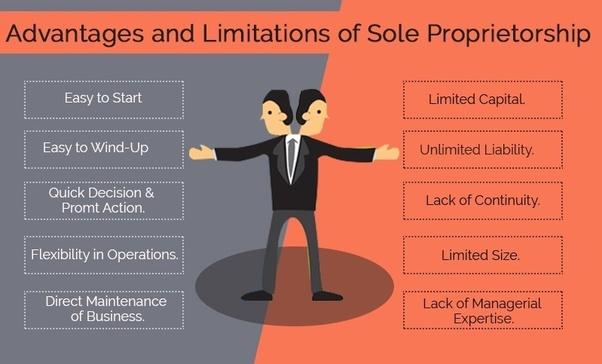Sole proprietorship is that form of business organisation; which is owned and operated, at the initiative and risk of only one individual-called the sole proprietor. The sole proprietorship is an informal type of business owned by one person.
Here Filing Bazaar team guides you to build your Sole Proprietorship and proprietorship firm registration

Features of Sole-Proprietorship:
Following are the salient features of the sole-proprietorship, as a form of business organisation:
1. There is individual ownership, in sole-proprietorship. One man alone-called the sole- proprietor is the owner of all assets and resources of business.
2. The sole proprietor is solely responsible for the management of his business enterprise. The sole proprietor may engage the services of professional managers; yet it is he who is responsible for regulating the decisions and actions of hired managers.
3. The sole proprietor is solely responsible for arranging finances for his business. He has to contribute capital from his own sources. He may also borrow money from friends, relatives and others-at his personal risk. Because of limited financial capacity of one individual (in majority of cases, of course), the size of one-man business is usually limited.
4. In one man business (i.e. sole proprietorship), there is independent decision-making by the sole proprietor. He need not consult with others; while taking decisions for his own business.
5. The liability of sole proprietor is unlimited, i.e. his personal properties may be utilized for payment of business debts; in case assets of business are insufficient to pay business liabilities, in full.
Advantages of Sole-Proprietorship:
Following are the main advantages of the sole proprietorship:
1. Easy to Start:
Sole-proprietorship is easy to start. What is required to start the business is just a decision of the sole-proprietor in this regard. No legal and procedural formalities are required to be complied with for starting the sole-proprietary business.
2. Maximum Incentive to Work:
In sole proprietorship, there is maximum incentive to work for the sole-proprietor.
Such incentive is usually due to the following factors:
· Liability of the sole proprietor is unlimited.
· There is no sharing of profits with anyone.
3. Independent Decision-Making, Facilitating Flexibility of Operations:
In sole proprietorship, there is independent decision-making, by the sole proprietor. He is under no obligation to consult with anyone while taking decisions pertaining to his own business.
As such, sole proprietorship has the advantage of flexibility of business operations i.e. according to circumstances; the sole proprietor can effect changes in the operational life of business – to take maximum advantage of favourable business opportunities.
4. Maintenance of the Secrecy of Business Affairs Possible:
Sole proprietorship is the exclusive form of business organisation, in which complete secrecy of business affairs is possible. The sole proprietor need not disclose his business secrets to anyone- howsoever close to him. Capitalizing on his position, he may make soaring profits-keeping business secrets absolutely confidential.
5. Personal Attention to Customers:
The sole proprietor can pay personal attention to his customers; and develop good customer relations. That is why, for businesses where personal attention to customers is necessary; sole proprietary form of business organisation is most suitable e.g. tailoring business, hair-cutting saloons etc.
6. Freedom from Governmental Control:
A sole-proprietary business is practically free from Governmental control and regulations. There is nothing like a ‘Sole Proprietary Business Act’, in our country.
7. Self-Employment:
Starting a sole-proprietary business immediately generates “self- employment” for the sole proprietor. This is a social advantage of sole proprietorship.
The disadvantages of Sole Proprietorships:
· Owners are fully liable. If business debts become overwhelming, the individual owner’s finances will be impacted. When a sole proprietorship fails to pay its debts, the owner’s home, savings, and other individual assets can be taken to satisfy those debts.
· Self-employment taxes apply to sole proprietorships. Owners must pay self-employment taxes on the business income.
· Business continuity ends with the death or departure of the owner. Because the owner and the sole proprietorship are one, if the owner dies or becomes incapacitated then the business dies with them and the money and assets of the business become part of the individual's estate. The assets and money are subjected to inheritance taxes and can have a great impact on employees of the sole proprietorship.
· Raising capital is difficult. Initial funds of the business are generated by the owner and raising funds for the business can be hard since they cannot issue stocks or other investment income. Loans may also be difficult if the owner does not have enough credit to secure additional money.
Here India’s largest corporate legal services provider team of Filing Bazaar professional lawyers will guide you and help in proprietorship firm registration.
View Source: http://filingbazaar1.strikingly.com/blog/advantages-disadvantages-of-sole-proprietorship

